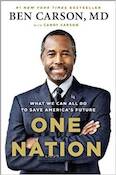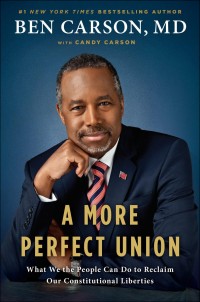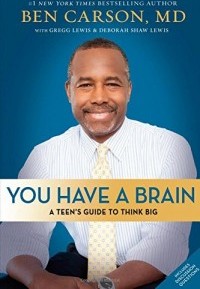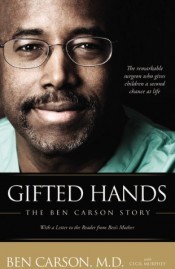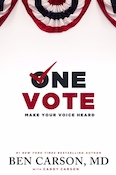One Nation: What We Can All Do to Save America’s Future
In light of the economic stagnation, swelling debt, out-of-control bureaucracy, and moral decline facing America today, Dr. Ben Carson’s “One Nation” is about the most optimistic book you will find at your local bookstore. Brimming with confidence about America’s ability to come to a consensus on such issues as debt, welfare, and gay marriage, Carson provides a hopeful, if idealistic, look at the problems plaguing society today, along with a set of solutions for improving the nation’s plight.
Told in a conversational tone sprinkled with personal stories, “One Nation” paints a picture of an honest, thoughtful political outsider who genuinely wants to fix the country through implementing a coherent conservative vision. Although Carson has thus far denied any intention of a 2016 presidential run, he reveals in “One Nation” that he would delve deeper into politics if he “felt called by God.”
In large part, the book reads as a “Carson on the issues” primer, infused with sage advice on how to better oneself and America at large through education, individual responsibility, respectful dialogue, a moral compass, and Constitutional vision.
As a layman’s introduction to conservative politics and the state of America’s political system, “One Nation” is solid. Carson is crystal-clear in conveying both information and perspective on every major issue, from the debt crisis and war on religion to tort reform and Glass-Steagall. Moreover, he places his political grievances in a context of broader societal problems, including political correctness, ignorance of history, bigotry of unfamiliar groups, and elitism.
Although Carson’s messages can occasionally get tiresome – we know we should be respectful of political opponents and that Thomas Edison is a better role model than Miley Cyrus – Carson keeps them fresh by explaining them through apt personal anecdotes. Here’s an example of how he illustrates the danger regarding America’s debt situation:
When I was nine or ten years old, some friends and I were climbing a rock mountain located in Franklin Park in the Roxbury section of Boston. We felt we were invincible and paid little attention to the signs forbidding such activities. I had climbed those rocks on many occasions and really didn’t even consider the possible consequences of falling— death or great bodily harm. This particular day, I was very high on the rock face when the ledge I was standing on broke, leaving me dangling with my hands tightly gripping the protruding rocks. At that point I realized that my life was in danger and it was my own fault. I earnestly prayed to God asking Him to save me and promising that I would never engage in such stupid activities again. Suddenly off to my right, I saw a cubbyhole large enough to admit my hand, providing me a better position from which I could place my feet and continue my climb. I have never been a fan of big, hairy wolf spiders and the cubbyhole featured a nest of them, but considering the alternatives, they looked like beautiful, welcoming creatures and I happily placed my hand in their domain. Gaining that leverage, I was able to complete my ascension to the top of the mountain for the very last time. I was never even tempted to climb it again. Our government reminds me of myself in this story as it pushes its debts higher and higher, ignoring the warning signs posted by history … Just as entering the domain of the spiders was not a pleasant option for me as a child, adopting a policy of fiscal responsibility is an unpleasant option for our government, which seems to have difficulty distinguishing needs from wants, but there will be no other option.
Carson seemingly has a life experience that perfectly relates to every political and societal problem discussed in “One Nation” – if he’s running for the presidency in 2016 he surely has a compelling script to work from. Carson includes a particularly memorable bit on the connection between reading and aspiration, claiming that his exposure to the stories of great people taught him that his destiny was entirely in his hands – not those of circumstances. Although such sketches might be criticized as basic, they shed much-appreciated personal perspective on issues that are covered in a less engaging manner by other political bestsellers. However, it is important to remember that “One Nation” merely provides an overview of Carson’s perspectives on the nation’s problems, rather than a heavily researched, hard-hitting analysis of every problem.
Another area where “One Nation” excels is in providing innovative solutions and action steps to the aforementioned challenges. To provide youth a perspective on the greatness of our nation and the opportunities it affords to us, Carson suggests something also interestingly recommended in Charles Murray’s “The Curmudgeon’s Guide to Getting Ahead“:
it would be highly instructive and beneficial to many of the young people in our nation to live abroad in a third world nation for several months and then return to the United States. Like many immigrants who come here, I believe they would immediately realize how many opportunities they have and how many choices are theirs for the taking.
And to solve the problem of voters mindlessly choosing candidates based on their party label without examining their policies:
I would love it if party labels were not allowed on ballots and people were forced to actually know who they were voting for. Blind loyalty to a party platform is tantamount to relinquishing the important duties of intelligent voting. Leaders of both parties want to have voters who will blindly follow them and not even consider what’s being said by their opponents. This was not the intention of the multiparty system. Rather it was to make sure that different sides of the issues were carefully examined, allowing the average citizen to then make an intelligent choice.
Carson provides other innovative solutions to problems like academic bias on college campuses, eliminating the budget deficit, and confronting hypersensitivity. Moreover, at the end of each chapter, Carson provides four action steps readers can take to better themselves, with regard to the central issue of the chapter.
In summary, Carson is at his best when he’s at his most creative – whether in telling stories or proposing innovative solutions. And, for all but political neophytes, he is at his worst when he’s at his most didactic – explaining issues we probably know about or stating the obvious (though his lessons are occasionally appreciated).
The real reason you should buy the book is for Ben Carson and the refreshing change of voice he represents. He is honest, trustworthy, and dedicated to this country and its values. At the same time, he is willing to reach across the aisle and have constructive discussions rather than insulating himself in an echo chamber. He is all about untangling arguments, getting to their core truths, and finding out exactly where people disagree and why. “One Nation” is predicated upon the belief that Americans have more in common than different, and Carson is exactly the voice we need to tie our country back together.
Book Review in The Blaze, by Alak Mehta
Tags: Ben Carson, One Nation: What We Can All Do to Save America's Future
- The Author
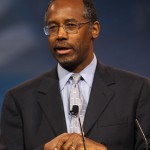
Ben Carson
** Exclusive CBC Author Interview with Ben Carson ** Ben Carson is an American author and retired neurosurgeon. In 2008 he […] More about Ben Carson.
- Books by the Author
- Related Articles
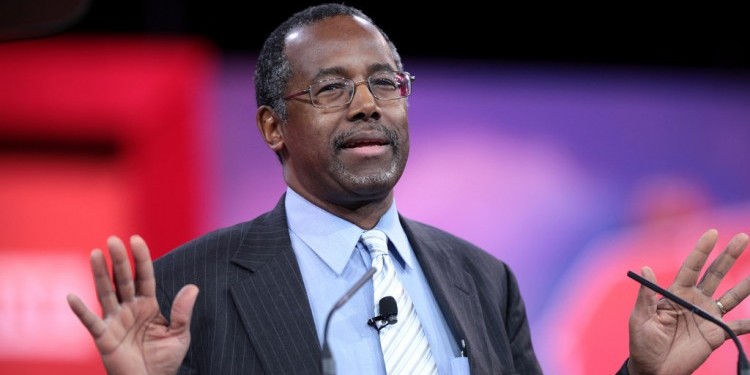
Dr. Ben Carson Has An Urgent Prescription To Cure Poverty
"I think poverty to a large extent is also a state of mind."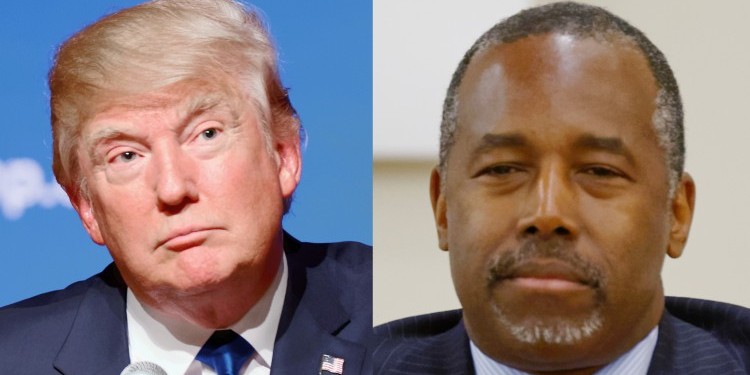
Should Ben Carson Be Trump’s HUD Secretary?
Is Ben Carson a good pick to be Trump's Secretary of Housing and Urban Development? Vote in our CBC reader[...]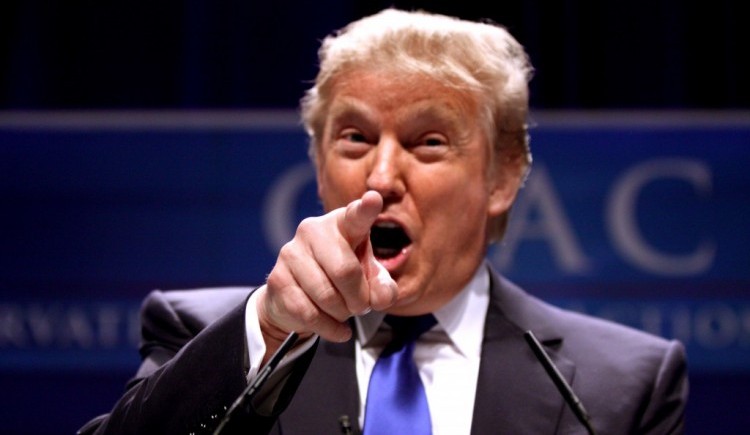
Check Out Trump TV’s Fall Lineup!
Have you heard the news about Trump TV? Check out this fall lineup preview, starring Laura Ingraham, Ben Carson, and[...]
You Won’t Believe What Chris Wallace Asked Ben Carson! See Carson’s Response!
"Do you worry that you’re being used as a prop for black voters and that supporting Donald Trump will end[...]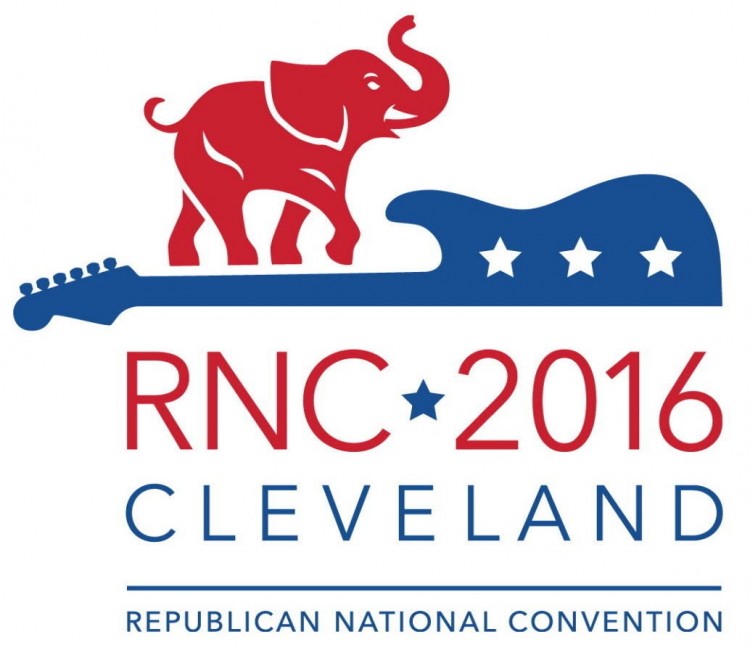
Top 10 Conservative Republican National Convention Authors
The Republican National Convention is here! From locking Hillary up to making America great again, America's premier conservatives are giving[...]
Ratings Details




